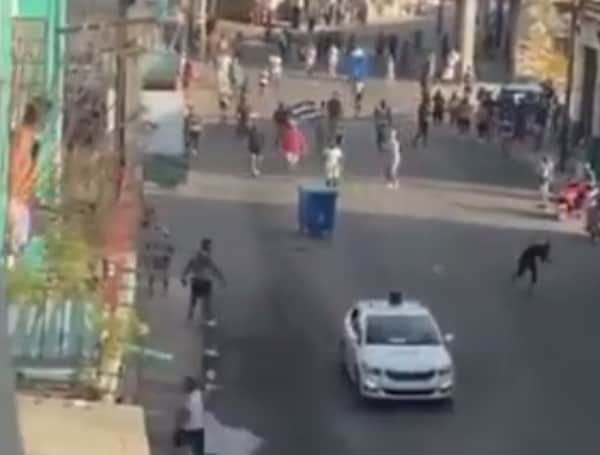Kendall Tietz
- Cuban police increased their presence throughout the country Monday following Sunday’s protests over food shortages, high prices and surging COVID-19 cases, the Associated Press reported.
- The country is facing the worst economic crisis in 30 years and Cubans across the country are protesting in the streets for the first time in over six decades, the WSJ reported. During the pandemic, living conditions have deteriorated, including shortages of basic goods, services and medical attention with coronavirus infections are on the rise.
- President Miguel Díaz-Canel placed the blame on the U.S. embargo and sanctions for shortages and power outages, the WSJ reported. He said that they restrict access to foreign currency to import food, raw materials and medicine, such as the COVID-19 vaccine.
Cuban police increased their presence throughout the country Monday following Sunday’s protests over food shortages, high prices and surging COVID-19 cases, the Associated Press reported.
The President Miguel Díaz-Canel has accused Cuban Americans of prompting the protests using social media, the AP reported. The protests went viral on social media and were seen in various Cuban towns and cities across the island, which are among some of the biggest displays of dissatisfaction seen in the country in years.
Cuba is facing an economic crisis related to sanctions put in place by the former Donald Trump administration, the AP reported. Leaders and law enforcement are trying to control demonstrations by ramping up police presence, which includes arresting protestors and prominent dissidents.
According to activists, more than 100 people have been arrested and remain missing or unaccounted for, including visual artist Luis Manuel Otero, poet Amaury Pacheco and the leader of Cuba’s most important opposition group, José Daniel Ferrer, human-rights organizations and activists told the Wall Street Journal.
“We’ve seen how the campaign against Cuba was growing on social media in the past few weeks,” Díaz-Canel said Monday in a nationally televised appearance. “That’s the way it’s done: Try to create inconformity, dissatisfaction by manipulating emotions and feelings.”
The country is facing the worst economic crisis in 30 years and Cubans across the country are protesting in the streets for the first time in over six decades, the WSJ reported. During the pandemic, living conditions have deteriorated, including shortages of basic goods, services and medical attention with coronavirus infections are on the rise.
“It’s the end of an era where a deep fear prevailed: the symbolic fear of going out to protest,” says Ernesto Hernández Busto, a dissident Cuban writer. “It marks a tremendous turnaround.”
President Joe Biden made a statement Monday expressing his support for the Cuban people and their right to peacefully protest and determine their own future.
“We stand with the Cuban people and their clarion call for freedom and relief from the tragic grip of the pandemic and from the decades of repression and economic suffering to which they have been subjected by Cuba’s authoritarian regime,” Biden said in the statement. “The United States calls on the Cuban regime to hear their people and serve their needs at this vital moment rather than enriching themselves.”
Internet service was also inconsistent while protests broke out, which may have been a tactic used by authorities so protestors couldn’t communicate with each other, the AP reported. Some were able to get around the internet blockage by using encrypted VPN connections, the WSJ reported.
Videos showed security agents and groups of soldiers beating up protestors, deployed police SWAT teams in downtown Havana and canine units on guard in the streets, the WSJ reported. Demonstrators were also seen destroying portraits of former dictator Fidel Castro and damaging police cars and motorbikes.
“They have also deployed plainclothes officers and militants to beat up anyone who dares to protest and give the impression that it is the people who are reacting against the protests,” said Ángel Rodríguez, a 31-year-old human-rights activist in Havana, the WSJ reported. Díaz-Canel told Cubans to take back control from demonstrators in the streets and other public places.
Díaz-Canel placed the blame on the U.S. embargo and sanctions for shortages and power outages, the WSJ reported. He said that they restrict access to foreign currency to import food, raw materials and medicine, such as the COVID-19 vaccine.
“If they really want to extend a gesture to Cuba, if they want to show concern for the people, lift the blockade and let’s see how we do. Why don’t they do it?” said Díaz-Canel, the WSJ reported. He said protestors “will have to go over our dead body if they want to overturn the revolution.”
“It was desperation that caused this to boil over and that desperation is not going anywhere,” Ted Henken, a Cuba analyst at Baruch College in New York told the WSJ. “It’s not clear that the government can come up with a solution to the country’s multiple crises even if it wanted to.”
Android Users, Click Here To Download The Free Press App And Never Miss A Story. It’s Free And Coming To Apple Users Soon.
Support journalism by clicking here to our gofundme or sign up for our free newsletter by clicking here
Content created by The Daily Caller News Foundation is available without charge to any eligible news publisher that can provide a large audience. For licensing opportunities of our original content, please contact licensing@dailycallernewsfoundation.org.
ICYMI:

